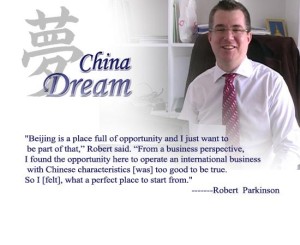Robert Parkinson, businessman and successful entrepreneur, moved to Beijing 8 years ago to manage China operations for a multinational company. In 2009, he embarked on a new journey in China when he set up his own headhunting company, RMG Selection.
Watch the video: http://english.cntv.cn/program/newshour/20130311/102681.shtmlTag Archives: Asia Employment
China Dream – Robert Parkinson – RMG CEO on CCTV English
- Wednesday, 13 March 2013 02:15

Annual Bonus: Schemes of the Enterprises – RMG on China Business News
- Monday, 18 February 2013 07:11
年终奖:企业的“小九九”
125亿、60个月月薪、黄金1000克、豪华宝马5辆、50万元股票……如今企业年终奖晒单的手笔是让人越发眼红了。
过去愿晒年终奖的企业不多,如今敢晒年终奖的企业各个都不是省油的灯。事实上,年终奖类似于员工工资收入,对于企业来说是个需要“保密”的人事项目,然而为何有那么多企业主动或是被动愿晒年终奖,恐怕在背后偷笑的不仅是拿到奖的员工。
“随着微博的普及爆发,近几年主动晒年终奖的现象越来越流行。” 罗迈国际(RMG SELECTION)的经理肖亿云对《第一财经日报》记者表示,“这可以看作是借助年终奖进行品牌宣传的行为,是企业展现自身实力的机会。”
华为、腾讯、360等等,这些平日颇具眼球效应的公司在年终奖的晒单名录上纷纷送上了自家的“大礼”,唯恐落后。虽不知其中的员工是否真正分享到了这笔巨款,但至少已经让圈外人足够羡慕、嫉妒、恨了。
派发如此具有吸引力的年终奖,企业能够因此带来更多的人才、招到更好的员工吗?对此,肖亿云认为,企业的晒单更大程度上是为了满足圈外人的好奇。“如今的求职者心态都比较成熟,并不会因为年终奖而心动,更重要的还是职位本身带来的平台和发展。”
罗迈国际于今年1~2月的一项中国人才调查(China Talents-Flow Survey)显示,41.21%的人表示并不在意年终奖的多少,如果有更好的工作机会甚至会不等年终奖到手就选择跳槽。调查同时显示,薪水越高,等年终奖后再换工作的人的比例越低,说明薪酬越高,对金钱的需求会相应降低,他们将从更多方面衡量一个工作机会的好坏,比如工作内容挑战性、工作生活平衡、企业文化等。
然而,年终奖晒不好,不仅不能吸引到好的人才,而且还有可能引起企业内部的人心动荡。
“60个月的年终奖属于个别团队,我们今年能拿6个月就不错了。”据腾讯员工介绍,在公司内部的论坛上对于“60个月”的年终奖也已经热议许久,对于不怎么赚钱的项目团队成员来说,即使身在腾讯,也颇感“待遇不同”。
“晒年终奖无疑是对企业绩效考核体系的一次考验。”在肖亿云看来,通常企业年初会制定各自公司的年终奖考核办法,年末兑现。如果这种机制不透明,很容易引起员工内部的嫉妒攀比心理,也不利于企业内部稳定。
晒年终奖无疑是把“双刃剑”,晒得聪明皆大欢喜还有不错的口碑,晒不好惹人笑话还遭员工非议。随着年终奖数字的节节攀升,明年,不知这些公司又将如何刷新这些年终奖数字游戏。
Read the whole article: http://www.yicai.com/news/2013/02/2482226.html
Other Reposts:
证券之星:http://finance.stockstar.com/SN2013020800000316.shtml
人民网:http://it.people.com.cn/BIG5/n/2013/0208/c1009-20469285.html
金融界:http://finance.jrj.com.cn/2013/02/08024515052219.shtml
凤凰网: http://tech.ifeng.com/internet/detail_2013_02/08/22062474_0.shtml
21世纪网: http://www.21cbh.com/HTML/2013-2-8/4ONjUxXzYxOTE4OA.html
Developing the Human Capital of Chinese Women – RMG CEO on Business Tianjin
- Tuesday, 22 January 2013 07:51

 It’s hard to find a Chinese woman, or a woman anywhere for that matter, who exhibits the Thatcherite demeanour of Britain’s ‘Iron Lady’. However, if you scratch beneath the surface you might find an iron hand in a velvet glove. Also, when we compare communications between Chinese men and women, we find men tend to lead the conversation in a strong way and women tend to listen and have more interactions. Chinese women are very good at staying focused on their goals with laser-like precision. In particular, the female’s performance will be resolute when they have to make tough decisions.
The notable second aspect of having female managers is that they are great multi-taskers with high procedural ability to execute. Scientists say that women have an ability to think in a three-dimensional way and their brains can easily deal with many different tasks at the same time. On the other hand, it is said that, men have a ‘lateral’ way of thinking to deal with one problem at a time but with a greater degree of focus. There is another set of data from Grant Thornton’s report that may prove these characteristics even better: Of the executive management positions occupied by women in China, most are COO (Chief Operating Officer) or other types of organisational roles with 45% of the positions and the least occupied role (by women) is that of the CEO occupying only 9% of those surveyed.
Most Chinese women are natural team workers with a high ‘EQ’ (Emotional Intelligence). As well as the inherent female genetic aspects of EQ, Chinese society and the local systems of family and education have encouraged this aspect of Chinese females because traditionally, girls in the family are trained to be the helper, supporter and backbone of the family unit. Therefore, they feel very comfortable when being involved deeply with other team members. In addition, the Chinese lady is known to be very humble and modest. Namely, they are taught to control their emotions very well in different situations as a woman. ‘Emotional Intelligence’ is the ability to identify, assess and control the emotions of oneself, of others, and of groups. Women in China are often educated more than men on this subject by their parents.
Indeed it’s amazing that the above features of women match the modern business needs so well. In fact, not enough effort is placed on promoting and developing the unique contribution women have to make in the modern Chinese business world and the preciousness of the male still overflows into the corporate world.
Every coin has two sides. Your biggest advantage could be a disadvantage to you as well. The stereotypical education of the Chinese lady is also about training women not to be pleased by external gains and not be saddened by personal losses. This concept makes most Chinese women unable to understand their own advantages and position themselves properly within the social or corporate situations. Female leaders who have succeeded still have to be faced with social consensus of the criticisms and accusation for what they have done. Those who are unable to undertake these pressures tend to escape easily. As a result, females sometimes encounter a career bottleneck. In response to this, the HR practitioner could create a special training system for female staff to help explain their unique position and how to get use this to their greatest advantage- both in their careers and in the management of their business. Some successful women in their companies could be the best candidates for a coach, for example, this is might also be a way to build self-confidence for shy Chinese women. It may be a useful thing to do (for an HR Manager for example) to invite the CEO or equivalent to express encouragement towards female executives openly and regularly, (in a form of ‘positive’ discrimination!) Women also tend to be more sensitive (in particular to language according to the G.T. study) than men and these small gestures could help build small eco-systems whereby women have a greater level of equality than in the overall society, which is of course very good for their sense of self-worth.
Secondly, HR departments may take family-related factors into consideration when helping female staff to plan their career paths and setting-up job goals, because men tend to have a greater sense of mission and responsibility- whilst females may be more concerned with family issues. Influenced by the traditional thought that men work for living and the women tend to be in the home, females must balance their work and life, and this directly leads to the reality that females have to play various social roles. Also, research suggests that female executives with high potential are less incentivised to achieve promotion and career development than their male counterparts. This mentality is more obvious in the later period of their career development curve. A way to alleviate this problem is to improve women’s welfare and working conditions. Examples include flexible working hours (so they can take their children to school, for instance). Another example is from one of our clients: They schedule a Parents-Children Day for all mums within their company. On that day, the company invites the husbands and children to work with the mums together. In this way, the family could understand the pressure and world load of their mums better and consequently reduce stress from the family side.
Last but not least, it’s very important to train the male leaders on communicating with women staff appropriately, considerately and with respect.There are many men who are excellent business leaders but struggle when it comes to the niceties of ‘small talk’ with female colleagues.
One report about society and culture from UNESCO demonstrates that the whole area in Asia-Pacific has lost USD 12-17 billion because of companies’ failure to properly utilise their female talent. How much of the loss is coming from your company? Or put better, how much do you stand to gain, financially and environmentally from better utilisation of the ‘fairer sex’!
It’s hard to find a Chinese woman, or a woman anywhere for that matter, who exhibits the Thatcherite demeanour of Britain’s ‘Iron Lady’. However, if you scratch beneath the surface you might find an iron hand in a velvet glove. Also, when we compare communications between Chinese men and women, we find men tend to lead the conversation in a strong way and women tend to listen and have more interactions. Chinese women are very good at staying focused on their goals with laser-like precision. In particular, the female’s performance will be resolute when they have to make tough decisions.
The notable second aspect of having female managers is that they are great multi-taskers with high procedural ability to execute. Scientists say that women have an ability to think in a three-dimensional way and their brains can easily deal with many different tasks at the same time. On the other hand, it is said that, men have a ‘lateral’ way of thinking to deal with one problem at a time but with a greater degree of focus. There is another set of data from Grant Thornton’s report that may prove these characteristics even better: Of the executive management positions occupied by women in China, most are COO (Chief Operating Officer) or other types of organisational roles with 45% of the positions and the least occupied role (by women) is that of the CEO occupying only 9% of those surveyed.
Most Chinese women are natural team workers with a high ‘EQ’ (Emotional Intelligence). As well as the inherent female genetic aspects of EQ, Chinese society and the local systems of family and education have encouraged this aspect of Chinese females because traditionally, girls in the family are trained to be the helper, supporter and backbone of the family unit. Therefore, they feel very comfortable when being involved deeply with other team members. In addition, the Chinese lady is known to be very humble and modest. Namely, they are taught to control their emotions very well in different situations as a woman. ‘Emotional Intelligence’ is the ability to identify, assess and control the emotions of oneself, of others, and of groups. Women in China are often educated more than men on this subject by their parents.
Indeed it’s amazing that the above features of women match the modern business needs so well. In fact, not enough effort is placed on promoting and developing the unique contribution women have to make in the modern Chinese business world and the preciousness of the male still overflows into the corporate world.
Every coin has two sides. Your biggest advantage could be a disadvantage to you as well. The stereotypical education of the Chinese lady is also about training women not to be pleased by external gains and not be saddened by personal losses. This concept makes most Chinese women unable to understand their own advantages and position themselves properly within the social or corporate situations. Female leaders who have succeeded still have to be faced with social consensus of the criticisms and accusation for what they have done. Those who are unable to undertake these pressures tend to escape easily. As a result, females sometimes encounter a career bottleneck. In response to this, the HR practitioner could create a special training system for female staff to help explain their unique position and how to get use this to their greatest advantage- both in their careers and in the management of their business. Some successful women in their companies could be the best candidates for a coach, for example, this is might also be a way to build self-confidence for shy Chinese women. It may be a useful thing to do (for an HR Manager for example) to invite the CEO or equivalent to express encouragement towards female executives openly and regularly, (in a form of ‘positive’ discrimination!) Women also tend to be more sensitive (in particular to language according to the G.T. study) than men and these small gestures could help build small eco-systems whereby women have a greater level of equality than in the overall society, which is of course very good for their sense of self-worth.
Secondly, HR departments may take family-related factors into consideration when helping female staff to plan their career paths and setting-up job goals, because men tend to have a greater sense of mission and responsibility- whilst females may be more concerned with family issues. Influenced by the traditional thought that men work for living and the women tend to be in the home, females must balance their work and life, and this directly leads to the reality that females have to play various social roles. Also, research suggests that female executives with high potential are less incentivised to achieve promotion and career development than their male counterparts. This mentality is more obvious in the later period of their career development curve. A way to alleviate this problem is to improve women’s welfare and working conditions. Examples include flexible working hours (so they can take their children to school, for instance). Another example is from one of our clients: They schedule a Parents-Children Day for all mums within their company. On that day, the company invites the husbands and children to work with the mums together. In this way, the family could understand the pressure and world load of their mums better and consequently reduce stress from the family side.
Last but not least, it’s very important to train the male leaders on communicating with women staff appropriately, considerately and with respect.There are many men who are excellent business leaders but struggle when it comes to the niceties of ‘small talk’ with female colleagues.
One report about society and culture from UNESCO demonstrates that the whole area in Asia-Pacific has lost USD 12-17 billion because of companies’ failure to properly utilise their female talent. How much of the loss is coming from your company? Or put better, how much do you stand to gain, financially and environmentally from better utilisation of the ‘fairer sex’!
Read the whole article: http://www.businesstianjin.com/index.php?option=com_content&view=article&id=5773:hr-developing-the-human-capital-of-chinese-women&catid=178:2013-january&Itemid=100
China talent-flow survey 2012 – 2013 launched by RMG Selection
- Monday, 14 January 2013 11:05

罗迈国际:2012- 2013年度RMG中国人才流动调查启动
随着全球经济不确定因素的增强,人才流动已经成为影响企业和行业经济的重大因素。那么2012年的人才流动的真实情况以及猎头在其中起到的作用是怎样的呢?
如果你想知道:
- 与你相比,你的同事被猎头联系的频率有多大呢?
- 你的员工与猎头的交谈内容是什么?你在面临着怎样的竞争?
- 你所联系的猎头是否是合适的?对此你应该有什么期待?
- 公司是否付给了你足够的工资?到底多久应该上调一次?
为了更好的了解大中国区范围内2012-2013年人才在地域、公司类型、行业及职位上的流动趋势,并深入了解其流动方式及隐含的原因,罗迈国际商务咨询(北京)有限公司发起了一次“2012-2013年中国人才流动市场调查” (RMG China talent-flow survey),通过此次调查用具体数据观察中国人才流动的具体情况。点击此处参与调查
罗迈国际商务咨询(RMG Selection)是一家由资深顾问组成的国际招聘组织,专注于各行业各职能部门的中高端人才搜寻,并同时提供人力资源咨询,薪资调研,心理测试以及领导力训练课程。想了解罗迈国际更多信息,请访问www.rmgselection.com
据悉,本次调查活动截止至2012年1月28日,参与调查的用户将会免费获得本市场调查一份,并且会收到罗迈国际免费提供的面试大礼包 — — 由资深猎头顾问编写的面试秘笈一份。
更多信息请浏览https://www.rmgselection.com或浏览我们的新闻网站:https://www.rmgselection.com/news/
12 Golden Rules to Hire and Keep Your People – RMG on New Manpower
- Wednesday, 26 December 2012 04:01
十二招聘要领,留住你的员工
如果我们问任何工作于领导阶层、财务管理或者人力资源战略的专业人士,在他们的工作中,什么是最头痛、最难解决的问题,答案往往集中于两个关键点:第一,如何雇用合适的人,第二,如何留住他们。事实上,现在我们留住的员工越多,那么在未来,我们遇到关于雇佣问题就会越小,然后我们就会受益于这个“稳定雪球”的结果。作为一个有着超过15年招聘工作经验的工作者,笔者已经了解到招聘与员工保留的整体性理念,即,这两个行为不是两个独立的过程,而是一个统一的活动。所以我们在这里与你分享RMG关于如何用招聘保留员工的12条黄金法则。
Read the whole article: http://view.online.zcom.com/full/28185/42.htm?prev